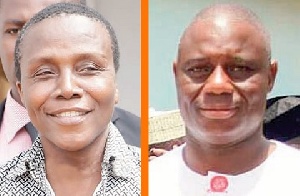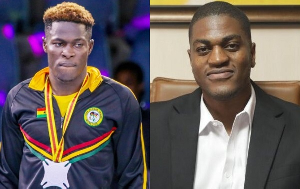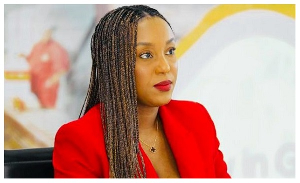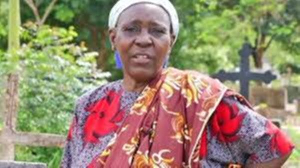Culture, Chieftaincy, and the President: My Mind Is Made Up, Don’t Confuse Me With Facts
The very popular adage about the ostrich, its head, and the sand fits precisely into President Kufuor’s policy direction and decisions on chieftaincy versus the current national discussion about its necessity. Ghanaians are currently debating, in the privacy of their homes and in the media, what we should do with the institution of chieftaincy. Constant negative publicity about chieftaincy misdeeds is the principal driving force behind public concerns and questions about chiefs and their relevance in today’s Ghana. While this discussion is ongoing, lasting policy actions continue to be put in place by the current government in a seemingly desperate attempt to solidify the “sacredness” of the institution of chieftaincy while completely ignoring the directions of public sentiment on the issue.I generally appreciate President Kufuor’s efforts in making reasonably good decisions to maintain an atmosphere of relative stability in the country, especially for economic development and growth. However, Mr. Kufuor’s government has made very serious chieftaincy decisions, or blunders, that seem to have succeeded, to some recognizable degree, in stifling probing questions about chieftaincy and the need for status quo chiefs at all in this day and age. I wonder if Mr. Kufuor has successfully pulled a fast one on the Ghanaian citizen.
President Kufuor is one of those conservative traditionalists who are stuck in a romanticized past on so many national issues. Of the standouts are his speeches and policies on chieftaincy and particularly the Asantehene. Mr. Kufuor has established a ministry for chiefs; and has tacitly encouraged the belief that the Asantehene may as well be the King of Ghana, even if non-Ashantis do not subscribe to the idea of a king anywhere in Ghana.
Chiefs and the institution of chieftaincy have often been tainted with serious corrupt land dealings; their historical legacy in the slave business which in so many respects became a livelihood for their ancestors has prompted Ghanaians and other peoples of African descent to seek more information about their ancestors’ complicity in that abominable business; and their unyielding cling to primitive rites some of which border on outright prosecutable murder; and the current unending news about their alleged complicity in illicit activities, such as the alleged connections that has come to light between some chiefs and the narcotic drug kingpins in and out of the country. These are just a few of the issues that impel Ghanaians these days to question their so-called sacredness.
In an attempt to downplay recognizable vulnerabilities and blurriness in the relationship between chiefs and the democratically elected central government, Mr. Kufuor has gone so far as to create the Ministry of Chieftaincy and Culture. The establishment of a government ministry for chiefs seems to have reduced any dread the chiefs may have of possible future decisions or actions by the government in the wider interest of the country that may in turn jeopardize their existence and livelihood. The ministry seems to have somewhat legitimized chieftaincy; but the legitimacy of chieftaincy has always been in question since independence. And there has always existed a conflict between the sovereignty of an elected central government versus the seemingly suzerain intrusions of the many chiefs in the national affairs of the country. This is an unwonted relationship that is very hard to digest. The idealism, assurances, and the protections of the constitution aside, what additional political clout, clear or veiled, have the chiefs gained since they are now nearer to the government with their own ministry? Since Ghanaians who live outside Ghana prop up the Ghanaian economy with our immense hard currency transfers, is it not reasonable to ask for a government ministry to serve our interests too? At least, our ministry would have a reliable revenue stream and pay for itself but not the chiefs’ ministry which will only be a drain on the economy. Do you realize how silly both ministries look?
We are all aware that bureaucracies once established are extremely difficult to dismantle. Keep in mind that the Ministry of Chieftaincy and Culture is here to stay. And to affirm the cementing of the ministry’s existence, to discourage contrary positions on the question of its necessity, and to let the public know that he is aware of the current discussions on chieftaincy, Mr. Kufuor put his foot down and recently told Ghanaians pointedly and the chiefs soothingly that his government will NEVER tamper with the chieftaincy institution. He may have pulled a fast one because nobody has taken him to task on that speech. Did he reflect seriously on the speech before delivering it? Why does he portray himself as not being amenable to change and reforms when the issue is chieftaincy affairs?
It is almost as claiming that Ghana does not need reforms in all other governmental agencies like the police, customs and excise, the judiciary, to name a few. If Mr. Kufuor will not tamper with the chiefs after he sets up a ministry for them, then he and the country may as well not even consider reforms in other areas of the government. With the ostrich’s head in the sand, all problems go away and the world becomes a serene heaven where everyone is a saint. Mr. Kufuor comes on as if he has made up his mind and he does not want to listen to the people who want to see a government with the solid backbone to confront these serious and sensitive questionable chieftaincy issues.
Not long after I read the news about Mr. Kufuor’s recent “never tamper” speech did I realize that he was aware of the questions being raised by today’s generation about the institution of chieftaincy and the impact of the bad behaviors of many chiefs on the country. I realized immediately that change was inevitable. I realized that attempts to suppress discussions that are contrary to the thrust of presidential declarations like the “never temper” speech may even propel faster the wheels of change. There is a chance for chieftaincy reforms, but I do not believe that it will happen any time soon. I believe that the discussions shall intensify in the next generation or two, who might be socially and politically astute and better educated, when tribe and ethnicity will not drive them to a blind sycophantic adherence to their chiefs and chieftaincy. They will raise the more pragmatic, level-headed questions about this old institution. The drive for change may start with gradual or sweeping reforms (with the chiefs and their supporters and cohorts fighting the reforms all the way), to a very serious marginalization and curtailment of the myriad redundant functions and roles of today’s chiefs, and just may be to a total replacement of the chiefs with duly elected local representatives.
In addition to Mr. Kufuor, there are other Ghanaians who steadfastly cling to chieftaincy, in its current evolvement, and do not want to hear a peep about changes and reforms. Their argument is simply this, why bother with what they consider to be an “essential” and “perfect” Ghanaian culture, heritage, and tradition. They argue for its functionality and relevance in the Ghanaian socio-political structure. In other words, why tinker with such a “noble” Ghanaian asset if it’s not broken. Are these people, President Kufuor included, very sure that the system is not broken? Their resolute faith in a misperceived unbroken institution makes them love and protect their chiefs, sometimes to death, and nothing in this world will make them ever consider the slightest thought of tinkering with this “valuable” institution, no matter what.
Next to them are those uninformed affective grassroots diehard supporters who defend their tribal chiefs (no questions asked), insult, berate, and/or violently attack critics and the curious for simply raising questions about chiefs’ integrity and their relevance in national policy decisions, their intrusions into national security matters, and their role in the economic matters of the country. They also cannot even tolerate the mere asking for a broader in-depth discussion on serious chieftaincy problems. To them, change and reforms are completely out of the question. With these supporters, woe unto those who at the very least broach the subject and their detractors on the other hand better tread carefully and watch their backs.
At the very far end of the field are the proponents of chieftaincy reforms. With them are also the extremists who cannot wait till all the chiefs go away completely now. Those who long for continued discussion on the debatable need for this sector of Ghanaian leadership or its complete disappearance often raise very provocative questions with their straight-forward comments, questions that are worthy of discussion here and elsewhere in the country. I personally do not advocate their total elimination. I don’t also subscribe to the hope that they will some day self-destruct in the midst of the technological, educational, political, and social advances that are being pushed forward in the country. May be they might as well self-destruct in due time. With their heavily laden gold ornamentations, native kente togas, the palanquins, and their huge colorful umbrellas, chiefs are lovely and attractive curiosities at durbars and national ceremonies. Together with being colorful displays at social functions, national celebrations, and durbars, they could be allowed to just perform the duties of ombudsman within their territorial boundaries, mediators of local disputes, and arbitrators of local group disagreements. Beyond that creates a murky functional duality and redundancy of their roles on one side and the role of the elected governing body at the other, unless both sides are comfortably feeding on each other very lucratively to the exclusion and detriment of the masses.
The underlying questions are many. Right now, let’s consider a few of them. The fact that there are so many of them and you can find one in each city, town and village, are chiefs a cultural phenomenon peculiar to Ghana and some African countries? Is chieftaincy a needful Ghanaian heritage that has to be treasured and passed on to the young? Anyway, do young Ghanaians, who are outside the lineage and who will be tomorrow’s leaders, even give a hoot about their chiefs and chieftaincy when they are aware that we already have a representative democracy? And on the question of culture, does today’s Ghanaian even have a distinct purely unadulterated culture or tradition, chieftaincy included, that he can sensibly claim as his own, define, and practice? Are the supporters of chieftaincy only those who benefit directly from it by virtue of their lineage or association? Also, do these diehard staunch supporters entertain unwarranted fears that if chieftaincy goes away so go their tribal identities? Or does chieftaincy equal tribal identity? Does the fixation on unreformed present day chieftaincy give the supporters a warm sense of comfort as long as it’s there and not the fact that it is really a veritable necessity and a defendable Ghanaian or an African culture?
Since one of the functions of this government ministry is for culture, I will discuss my curiosity and questions on the issue of African and Ghanaian culture. Let’s first look at the question of the existence of a broad continental African culture, individual African state culture, tribal, and group (town and village) culture. The very loud question here is: do we have anything that looks like a tangible African culture? Foreigners often naively lump all Africans together and apply individual attitudes, attributes, and behaviors to all of Africa and conveniently sum them up as African culture. Again, do Africans themselves believe in the existence of a true African culture? Or, due to one of the pitfalls in our learning process, are we being told by others that we have universal African cultural practices and we are readily accepting of what outsiders tell us what our culture should be? Again, I ask these questions simply because one of the dual functions of the government ministry is dedicated to culture. What Ghanaian culture did the government set up a ministry for? Please, spell it out for the people!
The particularly distinguishable Ghanaian culture that the ministry was set up for is very hard to fathom. Those who want so badly to have a clear-cut culture that they can call their own should examine all areas of our individual and group customary attributes and realize how they have all been diluted heavily by foreign influences. For example, our innumerable tribal languages on the continent negate forced attempts to pigeonhole a singular comprehensible oral African communication. As a limited solution, virtually all African countries have adopted their colonial masters’ languages in order to maintain common communication lines within each country. Even our own tribal languages, when used orally or written (that’s even rare), are interspersed with foreign words and phrases. We do better in expressing ourselves in our former colonial masters’ languages than our own. Our clothing, our music, and our mannerisms have equally not escaped heavy foreign influences, dilutions, and sometimes total replacements. What’s my point? It is simply this: If a government decides to oversee a culture by elevating it to a ministerial level, that culture or cultures should be spelled out cleanly. And my point is also directed at those who are the unflinching and unbending adherents of culture and tradition who cannot clearly separate what are truly their own away from all inescapable foreign dilutions. And we still try to lay claim to “a” culture!
I believe the public will be more accepting of a ministry for culture that is tasked with the responsibility to collect and protect priceless national relics, Ghana’s valuable works of art that are worth preserving, priceless artifacts, and important historical documents, such as presidential papers, rather than a ministry that oversees the occasional native drumming and dancing and durbars and other national celebrations and even cheap commercial grade carvings found in sidewalk kiosks. I can somewhat understand if those broader thoughts came into play in the establishment of the ministry. If not, do we then need a ministry for culture that may needlessly augment private preparations for durbars, and drumming and dancing?
By the way, why in the world did we, in our misguided brief glee over Dr. Kwame Nkrumah’s overthrow, destroy in wild abandon most of his documents and relics? This is an example of the tasks a ministry for culture should undertake, by tracking and preserving valuable items that give Ghana a solid, tangible, and empirical history.
I also may be more accepting of a government ministry for culture that oversees and preserves our internationally recognized priceless museum pieces, if we have any. Again, you all know that we do not need a separate government bureaucracy just for that, considering the country’s budgetary constraints. If Mr. Kufuor and his government did not consider the wider functions on culture when the ministry was established, and if he was not completely clear about the functional totality of a cultural ministry, then I believe it was tacked on as a diversion from what it really is: a ministry just for chiefs. And that is all it is.
And on the question of a king in Ghana, I take comfort in believing that a good many Ghanaians would agree with me that ascribing a tribal leader the accolade of a king in Ghana, even if he is considered a titular king of only the Ashantis, imposes on all other Ghanaians an uncomfortable overbearing leadership besides the president. That idea of a king in Ghana raises some tribal discomfort in Ghanaians who are not Ashantis. Being the only “king” in Ghana that I am aware of, there seems to be a tacitly tolerated hierarchy of leadership in the chieftaincy power structure in all of Ghana with the Asantehene at the top. I guess he is considered the head honcho of all Ghanaian chiefs. I bet that there are many other chiefs in Ghana, both minor and paramount, who privately question the king idea. Why not ascribe to themselves the title of a king too. Right now, with Mr. Kufuor’s unquestioning acceptance of a king in Ghana, the obvious question is, who is currently more powerful, the president or the “king”? Does Mr. Kufuor owe some form of allegiance and relegate himself to the Asantehene and does he also allow deference to the Asantehene, though Kufuor is the “all-mighty” president of Ghana? Or it’s the other way around. Can the president of Ghana ever dare order the arrest of this “king” or any other powerful chief if he is found to have committed prosecutable crimes against the state? We all know the natural answer to that question.
When the Asantehene travels outside the country, does he represent Ghana or only the Ashantis? There is a perception of a conflict of interest either way. And when he receives foreign dignitaries, does he do so only on behalf of the Ashantis or for all Ghanaian people? If he represents Ghana, or even the Ashantis alone, can we rightfully question his role in Ghana’s foreign policy direction? The Asantehene recently visited Morocco. I think that it is reasonable to enquire about the capacity in which he presented himself. Was he there as an ambassador of Ghana or just a “monarch” of the Ashantis? Reminder: we do have a president and government ministers for this purpose.
All of these questions apply to other chiefs in Ghana too. A good many of them travel overseas and attend functions as Ghanaian leaders and often seek charitable handouts only in the interest of their local areas of control and not in the broader interest of all Ghanaians. Individual Ghanaians who live outside or in Ghana are often inclined to behave likewise. They often seek the assistance of foreign charitable groups for only their villages or towns of birth. Of course, there is not much wrong with the narrower targets of each Ghanaian’s efforts to help because we can’t individually spread ourselves too thin. But, when it comes to a broader concern for the country, you wonder whether the narrower interests of the people in this case are equitable. Someone wrote, permit me to paraphrase because I do not remember the author, that the typical African has the innate obligation first to his immediate nuclear family as long as both parents are the products of the same tribe, then to the extended family, and then graduates to the village or town of birth, and ultimately to his tribe. That’s where all allegiances cease. And then remotely, if at all, does he consider his region and country. Some extremists would even go the extent of destabilizing their own countries, often unsuccessfully, in the selfish interest of the tribe. Many tribal upheavals of this kind have been misguided and have invariably brought chaos, misery and widespread conflicts that kill and displace millions of Africans. Of course, some will argue that tribal distinctions are an unavoidable part of the Ghanaian or African landscape. But my response is that it is incumbent on all leaders to behave, take actions, and institute policies that reduce tribal acuteness.
When it comes to tribal leanings, I believe that Mr. Kufuor has not learned from the mistakes and the legacy of his recent predecessors, especially Mr. Soldier/Politician Jerry Rawlings. Rawlings’ tribal leanings and his lack of a well balanced all-inclusive use of competent Ghanaians across major ethnic groups during the many years he stayed in power has left a bitter aftertaste with some larger ethnic groups. What we see now in the Kufuor government is a repeat of Mr. Rawlings’ era when tribal diversity was practiced with token extra-tribal appointments whilst maintaining the dominance of the leader’s own tribe in key government positions. What we also see now is this veiled and controlled, but sometime open, resultant antagonism between the prevailing tribal groups of the previous government and the current one. If the reader disagrees with my assessment, just take a cue from the exchanges, or I should say drivels, at least on this website tinged with unsavory and uncalled-for sharp tribal invectives even on topics that have nothing to do with ethnicity.
Oh, how we miss Kwame Nkrumah! Here was a guy who had the foresight at the outset of Ghana’s independence to conduct national affairs mostly without regard for tribe or ethnicity. He laid the foundations for the relative stability that the country has enjoyed up to today. He was a comprehensive visionary who tapped into a national and not a localized skill bank for top and minor government positions. He made mistakes, of course, but his power base of Ghanaians did not lean heavily to where he came from. These days we have shortsighted leaders who feel secure only when surrounded by and with partiality seek the interests of their kindred folk. By so doing, they are laying foundations for future polarized relations among Ghanaians. Predictable tribal shifts with each successive government may be a logical expectation of Ghanaians if our leaders stay so narrowly focused on tribe. In spite of any dent in Nkrumah’s efforts by the narrower actions of the leaders after him, I have hope that future leaders will be broad-minded, will love Ghana and Africa beyond their tribes and more than enough to institute all-inclusive policies in the wider interest of all.
Just as much as I admire many aspects of Mr. Kufuor’s performance, I will proffer an admonition about the Ministry of Chieftaincy and Culture: he should try to make it culturally relevant in the eyes of Ghanaians, not just for the chiefs, or it may end up as one of those bureaucracies that don’t produce but simply provide a living for its employees.
A cautionary note: For those who get knee-jerk jolts into trances of attack mode from anything they read but disapprove, please save your righteous indignation and insults not for me but for the deserving, such as your questionable chiefs and leaders. I would rather you pondered and evaluated your sanctimonious adoration for your chiefs, your susceptibility to baseless sycophancy and hero worship. I would rather like to read sensible critical responses that at least punch holes in my position. We all can learn from one another.



















